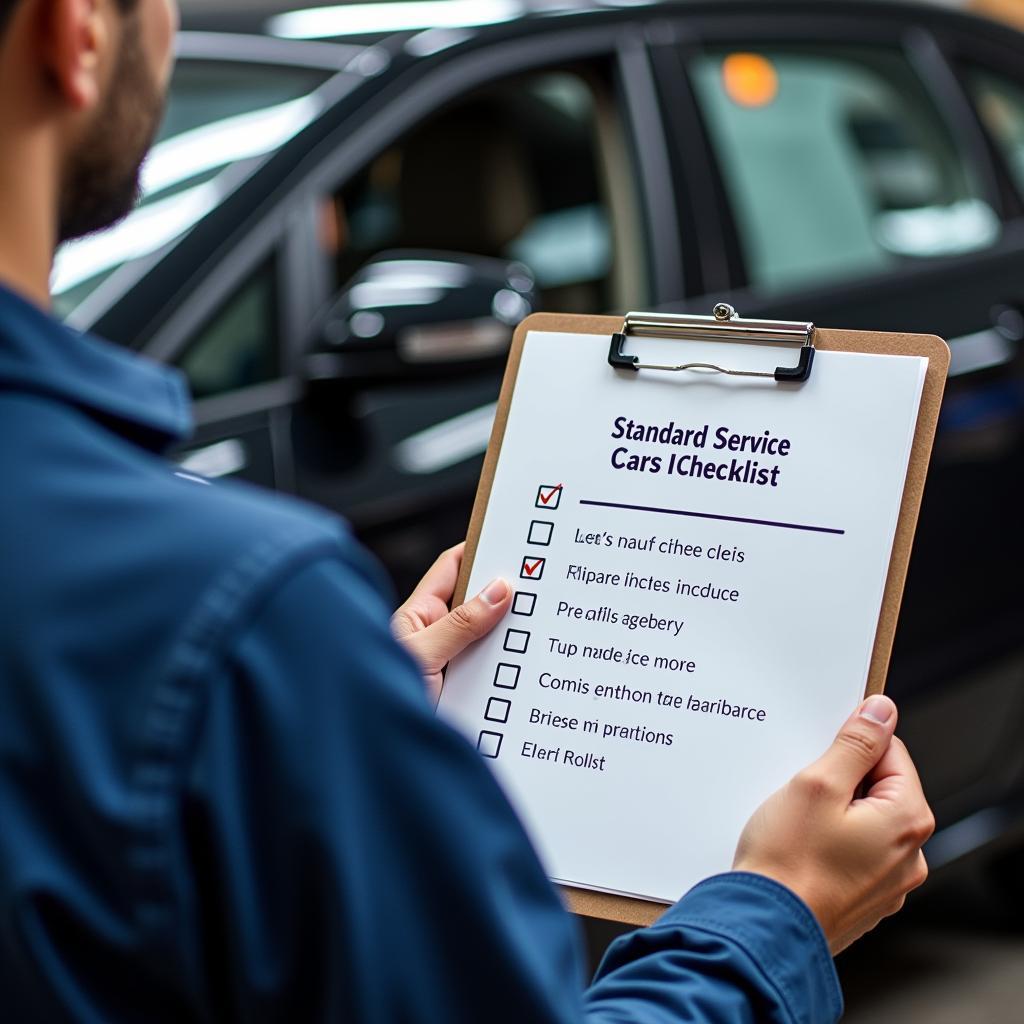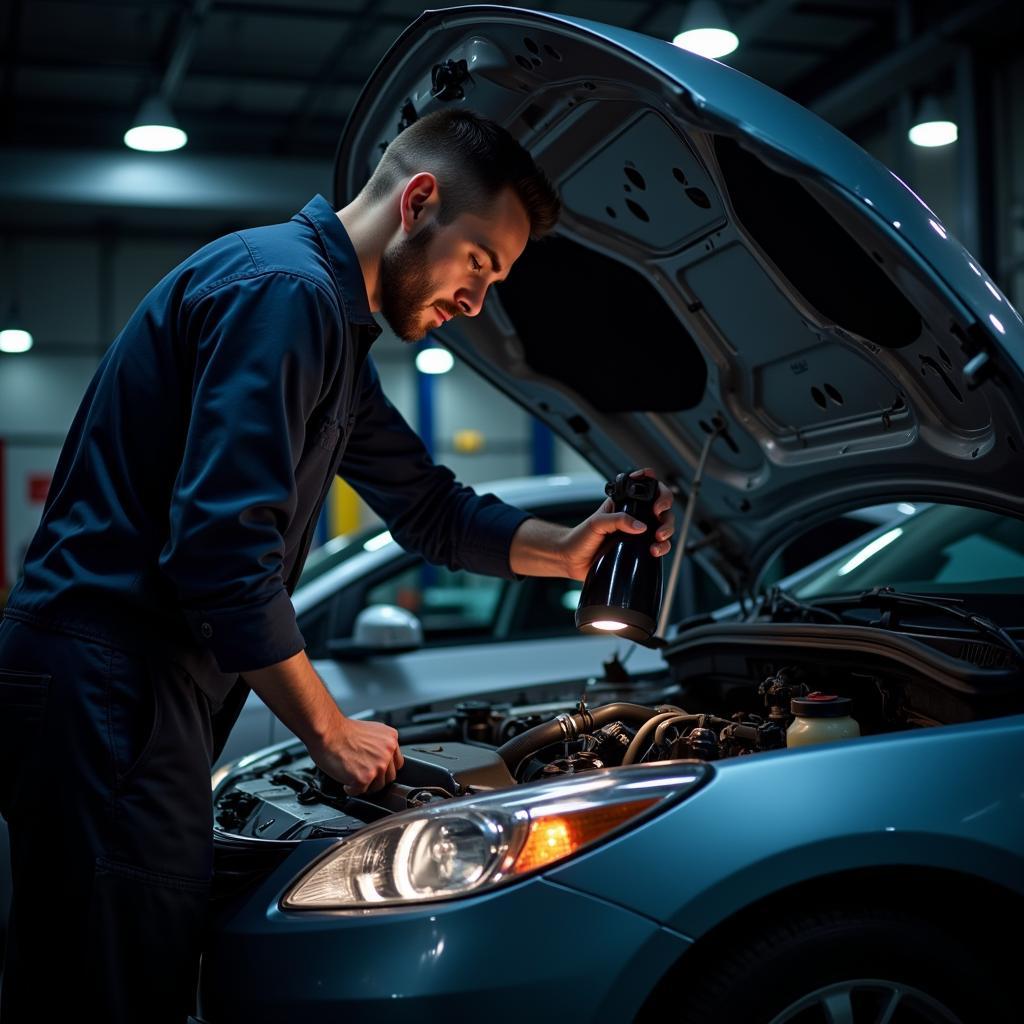What is in a Standard Car Service?
A standard car service is an essential part of vehicle ownership, ensuring your car remains in top condition and runs smoothly for years to come. But what exactly does this service entail? This comprehensive guide will delve into the intricacies of a standard car service, outlining the key checks, adjustments, and replacements typically included.
 Standard Car Service Checklist
Standard Car Service Checklist
Understanding the Importance of Regular Car Servicing
Before we dive into the specifics, it’s crucial to understand why regular car servicing is non-negotiable. Just like our bodies need regular check-ups, cars require routine maintenance to prevent minor issues from escalating into major problems. Regular servicing ensures:
- Safety: A well-maintained car is a safer car. Services address critical safety components like brakes, tires, and lights, minimizing the risk of accidents.
- Reliability: Regular servicing reduces the likelihood of unexpected breakdowns, providing peace of mind on the road.
- Longevity: By addressing minor issues proactively, you extend the lifespan of your vehicle and maintain its resale value.
- Fuel Efficiency: A well-tuned engine operates at peak efficiency, saving you money on fuel costs in the long run.
What Does a Standard Car Service Include?
A standard car service usually encompasses a comprehensive inspection of your vehicle, covering several key areas:
1. Engine Oil and Filter Change
Perhaps the most crucial aspect of any car service, an oil change involves replacing the used engine oil with fresh lubricant. The oil filter is also replaced to remove contaminants. This process ensures optimal engine performance and longevity.
2. Fluid Level Checks and Top-Ups
Various fluids keep your car running smoothly. A standard service includes checking and topping up essential fluids like:
- Coolant: Regulates engine temperature.
- Brake Fluid: Transmits force to the brakes.
- Power Steering Fluid: Assists in steering.
- Windshield Washer Fluid: Keeps your windshield clean.
- Transmission Fluid: (For automatic transmissions) Lubricates and cools the transmission system.
3. Tire Inspection and Pressure Adjustment
Tires are your only point of contact with the road. A standard car service includes:
- Tire Pressure Check: Ensures tires are inflated to the recommended pressure for optimal handling and fuel efficiency.
- Tire Tread Depth Check: Determines if tires have sufficient tread for safe driving.
- Visual Inspection: Checks for signs of damage, uneven wear, or other potential issues.
 Mechanic Inspecting Car Engine
Mechanic Inspecting Car Engine
4. Brake System Inspection
Your braking system is critical for safety. A standard car service typically involves:
- Brake Pad/Shoe Inspection: Checks for wear and tear and measures thickness.
- Brake Disc/Drum Inspection: Looks for signs of warping, scoring, or other damage.
- Brake Fluid Level and Condition Check: Ensures sufficient fluid level and proper fluid condition.
5. Lights and Electrical System Check
Properly functioning lights are crucial for visibility and safety. A standard service includes:
- Headlights, Tail lights, Brake Lights, and Turn Signals: Checks for burned-out bulbs and proper alignment.
- Battery Test: Assesses battery health and charge level.
- Alternator Check: Ensures the alternator is charging the battery properly.
6. Air Filter Replacement
The air filter prevents dust and debris from entering the engine. A clogged air filter can reduce engine performance and fuel efficiency.
7. Cabin Air Filter Replacement (If Applicable)
The cabin air filter cleans the air entering the passenger compartment, improving air quality.
8. Visual Inspection of Belts and Hoses
The mechanic will visually inspect belts and hoses for signs of cracking, fraying, or wear, ensuring proper engine function and preventing potential leaks.
9. Exhaust System Check
The mechanic will inspect the exhaust system for leaks, damage, or excessive noise, ensuring it’s functioning correctly and safely.
Frequency of Standard Car Services
The frequency of car servicing can vary depending on factors like your car’s make and model, age, mileage, and driving conditions. However, a general guideline is to have your car serviced:
- Every 6 months or 5,000 – 7,500 miles: For most modern vehicles.
- Annually or every 10,000 miles: For older vehicles or those driven less frequently.
Always consult your car’s owner’s manual for the manufacturer’s recommended service intervals.
Beyond the Standard: Additional Services
While the aforementioned points cover the essentials, a standard car service can be tailored to your vehicle’s specific needs and mileage. Additional services might include:
- Spark Plug Replacement: Crucial for ignition and combustion.
- Fuel System Cleaning: Removes deposits and improves fuel efficiency.
- Coolant Flush: Replaces old coolant for optimal engine temperature regulation.
- Transmission Service: (For automatic transmissions) Involves fluid and filter changes.
“Regular car servicing is an investment, not an expense. Proactive maintenance saves you money in the long run and ensures a safe and enjoyable driving experience.” – John Smith, Senior Automotive Technician at CarServiceOnline
Conclusion
Understanding what is included in a standard car service empowers you to make informed decisions about your vehicle’s maintenance. By adhering to a regular service schedule, you ensure your car remains safe, reliable, and in peak condition for years to come.
Need expert car servicing? Contact us via WhatsApp: +1(641)206-8880, or Email: [email protected]. Our dedicated team is available 24/7 to assist you with all your car care needs.

